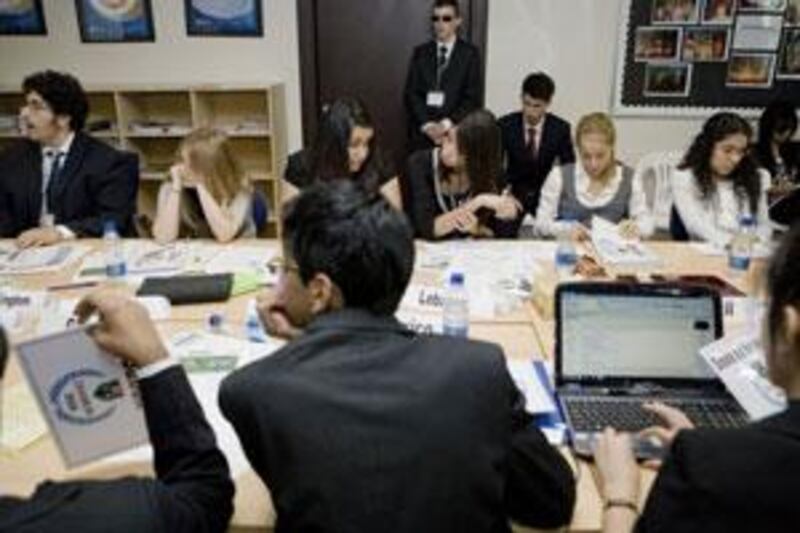DUBAI // When Aahan Bhojani was elected secretary general of the Model United Nations last year, he dedicated himself to seeing the intractable conflict in Kashmir from the Pakistani point of view. That is even though Mr Bhojani is an Indian. Before the student-led replication of the international body was finished with its work, he found himself with a greater understanding of Pakistan's position.
It was more nuanced than he previously had believed. "That's the thing about the Model UN," Mr Bhojani said. "In order to succeed you have to see the other side." More than 200 teenagers from 13 schools in Abu Dhabi, Dubai, Ras al Khaimah and Egypt are learning about "seeing the other side" during a four-day Model UN held at the Dubai International Academy. "The idea behind it is that you learn to see a different point of view and that you learn tolerance through it," said Linda Dubock, the chairman of the board of directors at The Hague International Model United Nations.
"It can be extremely hard for people to put themselves into the position of another country that they may not approve of in their heart." The Model UN has sessions simulating the deliberations of the UN's Security Council, General Assembly, the Human Rights Council and the World Economic Forum. The conference is the second in the UAE. Both have been run by Dubai International Academy (DIA). Model UN sessions in the Netherlands often involve more than 200 schools from around the world.
The focus of the Dubai session was the impact of globalisation, particularly on disarmament, international security and social and humanitarian issues. Preparation involves weeks of study and compiling reports on the dynamics that steer the countries the students represent which are not the ones to which they belong. "They have to learn everything about what the standpoint of the country is," said Karl Mythen, a board director with The Hague group, who was visiting the UAE. "You have to learn about the history of the country and why it has that viewpoint."
Working within the constraints of UN protocol had benefits beyond empathy, he added. Pupils learned to negotiate, debate, find a consensus and build teams. Another goal of the session was to help build trust and appreciation for the UN's role in the region as part of the group's goal to "inform people of the role of the UN and to understand what it was founded for and how it works". "It is easy to criticise but it's the only peacemaking body we have in the whole world," Ms Dubock said. "This is why we're particularly interested in supporting students in the Middle East.
"It is to make global citizens of them. Not that young Arab people should feel excluded, but they should be part of that peacemaking process, which leads from understanding how to negotiate, how to be diplomatic." Seeing young people approach a problem "without political baggage" was "refreshing", she said. One of the selected speakers at the conference is Najla al Awadhi, the chief executive of television channels in Dubai Media Inc and a member of the Federal National Council.
Poonam Bhojani, the director of DIA, said Ms al Awadhi represented a role model for young women. The Model UN is also about getting young people to understand international events and how to participate in governance. "If you want to have sustainable societies that are fair, people have to be engaged in the process," Mr Mythen said. Anja Gullerfelt, the DIA student who was selected as this year's secretary general, said the Model UN's agenda this year was ambitious.
"[We are] looking at the situation in Afghanistan and Iran, the spreading of epidemics, the welfare of migrants and their families," she said. "I think I've learned more about the UN as a body," said Lisa Van Doesselaer, the chairwoman of the Model General Assembly. "We see the organisation and how hard they have to work." Miss Van Doesselaer said at first she did not understand why the countries on the Security Council had a bigger say in matters, but the exposure made her appreciate the UN's structure.
"What I think is important to realise is that, within an organisation so big, there are such huge responsibilities and it takes a long time to make decisions." kshaheen@thenational.ae







